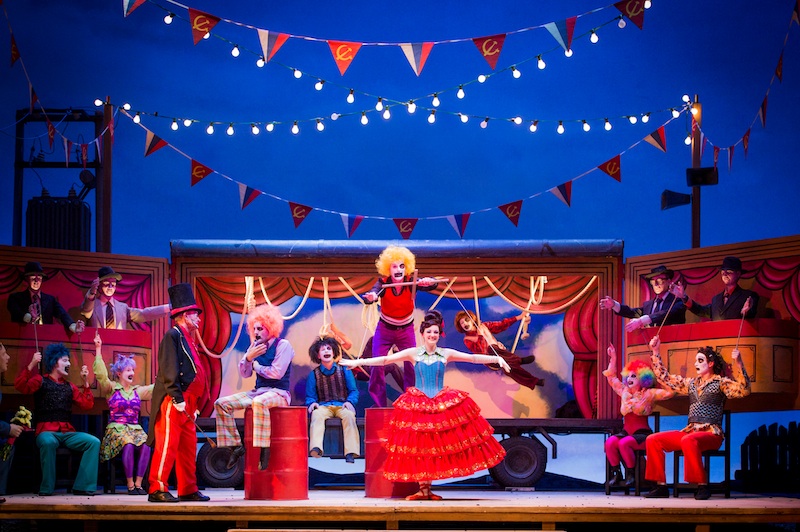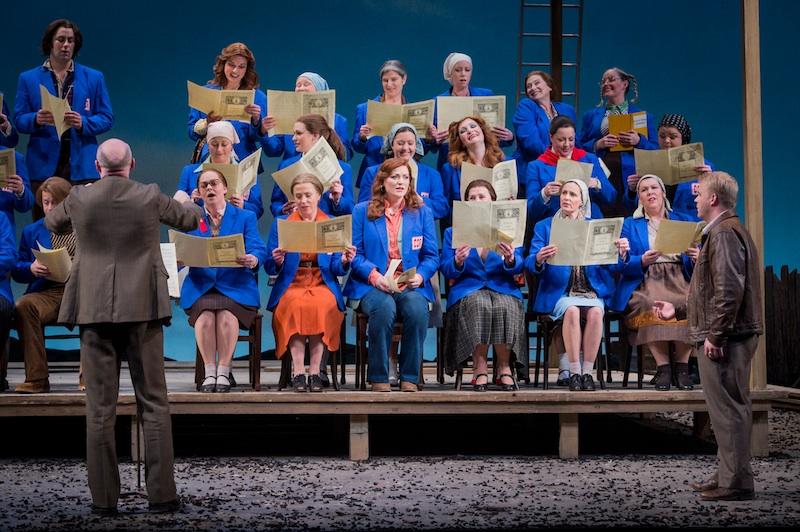Groan-inducing rhymes are becoming a feature of Opera North’s autumn season. Like their Coronation of Poppea, this revival of The Bartered Bride has some cracking lines. Matching "swanky" with "cranky" and "lanky" is pretty neat, but hearing James Creswell’s oleaginous Kecal slip in "hanky-panky" is a masterstroke.Quite why we’ve got sporadic surtitles is a mystery; Leonard Hancock and David Pountney’s smart translation is clearly audible throughout. This company’s chorus is one of its greatest assets, and every syllable tells.
First staged in 1998, Daniel Slater’s production of Smetana’s Czech nationalist classic sets the action in the early 1970s. So, when the inhabitants of this Bohemian community urge one another to “Make the best of youth and freedom” it has a bittersweet poignancy. For many of Smetana’s villagers, the only happiness can come via the consumption of huge amounts of foaming lager, and Opera North’s props department deserve special praise for providing industrial quantities of highly realistic-looking pilsner. We’re almost in the modern era, but the practicalities of life in the Eastern Bloc necessitate following rules and restrictions just as severe as the social mores which governed 19th-century life.
Beneath the superficial conformity there’s the sense that order is only just maintained
This doesn't mean to say that this production is a dour, grey affair. It isn’t. This revival is one of the frothiest, funniest things this company has produced. The period’s grislier details aren’t overdone – there are some superb hairstyles on display, and an abundance of pastel shades and artificial fabrics, but they never intrude. Blue lapels sport Party badges in the opening chorus, and even the children wear Young Pioneer red scarves. Beneath the superficial conformity there’s the sense that order is only just maintained. A collective shimmy around an impromptu maypole nearly ends in disaster, and an orderly folk dance almost descends into a drunken brawl. The set pieces are choreographed with some zip, and Robert Innes Hopkin’s spare, beautifully lit stage design is evocative but unobtrusive.
Kate Valentine and Brenden Gunnell as Mařenka and her lover Jeník are outstanding, their volatility making them more credible. Mařenka’s fury on finding out that her weak father Krušina has planned her marriage to someone she’s never met has us rooting for her, and Valentine’s feistiness is a joy to watch. Gunnell’s Jeník is bullish and impetuous, only gradually showing his smartness as he turns the tables on those who seek to prevent his marriage.
 The standout performance is Creswell’s mayor Kecal – a grey suited Party apparatchik accompanied by a pair of briefcase-wielding flunkies. As befits a career bureaucrat, his power is reinforced by voluminous paperwork. There’s a delirious moment near the opera’s close when the villagers turn on Kecal, demonstrating their fury by tearing up the contents of his files. Nicholas Watt’s shy Vašek isn’t just a figure of fun; the stammering is rightly underplayed and he’s someone we root for rather than laugh at, a hapless victim of overbearing parents. The marvellous Fiona Kimm is terrific as his waspish mother.
The standout performance is Creswell’s mayor Kecal – a grey suited Party apparatchik accompanied by a pair of briefcase-wielding flunkies. As befits a career bureaucrat, his power is reinforced by voluminous paperwork. There’s a delirious moment near the opera’s close when the villagers turn on Kecal, demonstrating their fury by tearing up the contents of his files. Nicholas Watt’s shy Vašek isn’t just a figure of fun; the stammering is rightly underplayed and he’s someone we root for rather than laugh at, a hapless victim of overbearing parents. The marvellous Fiona Kimm is terrific as his waspish mother.
Slater’s masterstroke is the lurid travelling circus which pitches up at the start of act 3 (pictured above right) – the opening of the trailer doors and the ensuing 10 minutes of are an irresistible coup de theatre. Conductor Anthony Kraus has the measure of the score – the overture’s fugal writing unfolds with exhilarating energy, and Smetana’s all-important woodwind writing is projected with effortless clarity. It's joyous, accessible stuff, in other words, and as an introduction to the pleasures of opera, you’d struggle to find a show as engaging as this.
- The Bartered Bride at Leeds Grand Theatre until 31 October, then on tour to Newcastle, Salford and Nottingham















Add comment